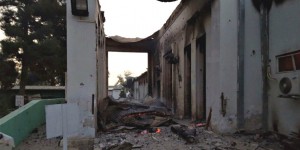Professor Ohlin, Associate Dean for Academic Affairs and Professor of Law from the Cornell Law School led a different type of talk at this weeks Becker/Rose House Cafe. Instead of giving a talk or simply answering our questions on the subject he led us in a discussion of prevalent and current issues. Instead of us asking him questions to learn from him, he asked us questions and thus challenged us and made us learn from each other. The complicated legal problems behind the US shooting of a Doctors Without Borders hospital in Afghanistan was more than just right or wrong. It became a question of what was fair game in war and what actually happened. I had never known the many rules and regulations of war but I quickly learned that the details mattered.
While civilians and hospitals are protected under war law, there are exceptions to these rules and this is where the details become crucial. The fact is, that war leaders weigh the cost of civilian lives to the importance of their target. In this way they determine if the killing of civilian lives is disproportionate. Imagine that, thousands of innocent lives that are declared a proportionate loss in the attempt to attack a target.
Professor Ohlin seemed to have a laid back demeanor, leaning back against the coach with his arm up, as he led us in the discussion of how many lives were worth sacrificing to the purpose of war. But that is an inevitable fact of war, that innocent people die. In the case of the United States, this entitlement to kill led them to mistakenly hitting a protected hospital. 
One person in the audience spoke up and said “It is about time that someone is holding the United States accountable for its mistakes.” This was interesting to me because I had never thought about how instances like this were punished. I found that the country could demand reparations and place economic sanctions or government officials could be put on trial.
The talk today taught me a lot about international war law, most of which I would have never otherwise known. It showed how important details are and how even in war there are both rules and exceptions.

I agreed with your post regarding the importance of details in international law. But I found it quite unsettling how I once had the idea that law is so structured and well-defined, when in actuality, as you mentioned, there are rules and exceptions. This makes me wonder if the law system is defined enough of if it makes it too easy to get away with senseless acts, such as war crimes.